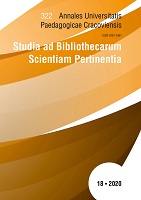Biblioteki w szkołach autonomicznej Galicji
Libraries in the schools of autonomous Galicia
Author(s): Edmund Juśko, Andrzej NiedojadłoSubject(s): Library operations and management, School education, State/Government and Education, Sociology of Education
Published by: Wydawnictwo Uniwersytetu Komisji Edukacji Narodowej w Krakowie
Keywords: Galicia; folk schools; high schools; district libraries; reading rooms;
Summary/Abstract: During the period of autonomy, the network of libraries in popular schools was still not very dense. There were schools without libraries or with only a few publications. The situation in secondary schools was much better. Virtually all of them had libraries with two departments for teachers and students. They also had relatively large and numerous collections. Funds for the purchase of books were received by folk and secondary schools from the National School Council, or they increased their book collections as a result of donations from various institutions or private individuals. In addition to libraries operating at schools, libraries in districts were also organised, which could only be used by teachers of folk schools and were supervised by district school councils. All libraries were aimed at providing factual knowledge to teachers and students. Teachers of secondary schools used libraries to a greater extent than teachers of folk schools. This problem was noticed by the National School Council. Regardless of the large number of collections, libraries were often students only contact with books. A properly selected and assembled collection of books had an effective influence on students’ ideological attitudes and social behaviour. In the process of raising the intellectual level of students and their upbringing in secondary schools, the Dragon (a reading room) played a clear role. The reading room’s purpose was to supplement and expand the knowledge acquired in the school lesson process and satisfy students’ individual interests and skills. In terms of upbringing, the reading room was a place for organising evenings, mornings, anniversaries of historical figures, ceremonies of state (court) holidays, poetry readings, and songs, that is, organising the social life of students. For young people, the room performed a cultural function within which national values started to dominate over time. It prepared them to function in adulthood as the social and intellectual elite of the future Second Polish Republic.
Journal: Annales Universitatis Cracoviensis. Studia ad Bibliothecarum Scientiam Pertinentia
- Issue Year: 2020
- Issue No: 18
- Page Range: 32-48
- Page Count: 17
- Language: Polish

